Household
How what you do in the house impacts your carbon emissions
- Energy efficient ways to wash your clothes
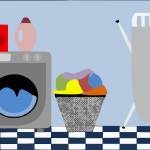 The way you wash your clothes in the washing machine can make a big impact on the carbon emissions you are producing. You can save a quarter of a ton of carbon emissions a year and save money with these tips below. Loading the washing machine The easiest way to reduce the carbon footprint of… Read more: Energy efficient ways to wash your clothes
The way you wash your clothes in the washing machine can make a big impact on the carbon emissions you are producing. You can save a quarter of a ton of carbon emissions a year and save money with these tips below. Loading the washing machine The easiest way to reduce the carbon footprint of… Read more: Energy efficient ways to wash your clothes - Everyday actions that make little difference to your carbon footprint
 The task to get to net zero lifestyle is big, but we don’t need to re-examine every action we do to reduce our emissions. The best route to reduce our carbon emissions to do the big things first and not worry about the things that only reduce our emissions by a fraction. There are actions… Read more: Everyday actions that make little difference to your carbon footprint
The task to get to net zero lifestyle is big, but we don’t need to re-examine every action we do to reduce our emissions. The best route to reduce our carbon emissions to do the big things first and not worry about the things that only reduce our emissions by a fraction. There are actions… Read more: Everyday actions that make little difference to your carbon footprint - Reducing the carbon footprint of having a shower
 When we have a shower, it adds to our carbon emissions we create from our household. But how can you reduce your carbon footprint from having a shower? This depends on the time you spend in the shower and the type of showerhead and boiler you use. It is a very easy way to cut… Read more: Reducing the carbon footprint of having a shower
When we have a shower, it adds to our carbon emissions we create from our household. But how can you reduce your carbon footprint from having a shower? This depends on the time you spend in the shower and the type of showerhead and boiler you use. It is a very easy way to cut… Read more: Reducing the carbon footprint of having a shower - Dealing with food waste
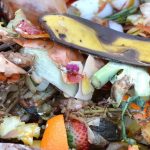 Food waste contributes 12% to greenhouse gas emissions globally. We waste between 30-40% of our food each year and in the UK, the amount of consumable food we waste is worth £284 per person. Food waste makes a large part of all the waste you make, as we throw away 3 kg of food per… Read more: Dealing with food waste
Food waste contributes 12% to greenhouse gas emissions globally. We waste between 30-40% of our food each year and in the UK, the amount of consumable food we waste is worth £284 per person. Food waste makes a large part of all the waste you make, as we throw away 3 kg of food per… Read more: Dealing with food waste - Switching off the lights
 One of the easiest ways to reduce your carbon footprint is to switch off lights in rooms that you are not using. Lighting your home makes up 10% of your residential carbon footprint. There is an opportunity to make significant savings on your carbon footprint by choosing the right bulb and being less careless leaving… Read more: Switching off the lights
One of the easiest ways to reduce your carbon footprint is to switch off lights in rooms that you are not using. Lighting your home makes up 10% of your residential carbon footprint. There is an opportunity to make significant savings on your carbon footprint by choosing the right bulb and being less careless leaving… Read more: Switching off the lights - The best way to wash dishes
 If you want to reduce our carbon footprint from washing dishes, what method should we use? Should we wash the dishes ourselves or use a dishwasher? Research from Professor Bernes-Lee show easy ways to wash our dishes in a more energy efficient way. Should we use the dishwasher or hand wash dishes? Research shows that… Read more: The best way to wash dishes
If you want to reduce our carbon footprint from washing dishes, what method should we use? Should we wash the dishes ourselves or use a dishwasher? Research from Professor Bernes-Lee show easy ways to wash our dishes in a more energy efficient way. Should we use the dishwasher or hand wash dishes? Research shows that… Read more: The best way to wash dishes - Wish-cycling: putting things that can’t be recycled in the recycling bin
 Waste experts have coined a phrase to describe people putting unrecyclable goods in the recycling bin in the hope it will be recycled and therefore, in their mind, have done the right thing. It is known as ‘wishcycling’. Surveys show that 80% of the public have tried to recycle something that can’t be recycled and… Read more: Wish-cycling: putting things that can’t be recycled in the recycling bin
Waste experts have coined a phrase to describe people putting unrecyclable goods in the recycling bin in the hope it will be recycled and therefore, in their mind, have done the right thing. It is known as ‘wishcycling’. Surveys show that 80% of the public have tried to recycle something that can’t be recycled and… Read more: Wish-cycling: putting things that can’t be recycled in the recycling bin - 5 things you can do to fight climate change in your garden
 Managing your garden in the right way will support the ecosystem that is struggling with climate change. Increasing carbon emissions is creating a double disaster of a climate change crisis and a biodiversity crisis. There has been a big drop in wildlife globally and we are on track to lose over a quarter of species… Read more: 5 things you can do to fight climate change in your garden
Managing your garden in the right way will support the ecosystem that is struggling with climate change. Increasing carbon emissions is creating a double disaster of a climate change crisis and a biodiversity crisis. There has been a big drop in wildlife globally and we are on track to lose over a quarter of species… Read more: 5 things you can do to fight climate change in your garden - How to reduce your carbon footprint if you are renting
 If you are renting your home, there are limits to what we can do to reduce our carbon footprint. It is not possible to install heat pumps, put in double glazed windows or install solar panel roofs without the landlord’s permission. But what can you do instead? It’s still possible to reduce your carbon footprint… Read more: How to reduce your carbon footprint if you are renting
If you are renting your home, there are limits to what we can do to reduce our carbon footprint. It is not possible to install heat pumps, put in double glazed windows or install solar panel roofs without the landlord’s permission. But what can you do instead? It’s still possible to reduce your carbon footprint… Read more: How to reduce your carbon footprint if you are renting - What affects the carbon footprint of pets?
 Pets contribute to the carbon footprint of your household. Should this affect your choice of pet? What can you do if you already have one? There are two main things to consider: the size of the pet and the food they eat. Size of the pet Research shows how the size of the pet can… Read more: What affects the carbon footprint of pets?
Pets contribute to the carbon footprint of your household. Should this affect your choice of pet? What can you do if you already have one? There are two main things to consider: the size of the pet and the food they eat. Size of the pet Research shows how the size of the pet can… Read more: What affects the carbon footprint of pets? - Cooking utensils that reduce carbon emissions and save money
 How can you cook, bake and warm up food in a way that reduces your carbon footprint? Choosing energy efficient cooking utensils in the kitchen are way of lowering your carbon footprint and saving money on your energy bill. Here are a few tips that will help you use less energy when cooking and reduce… Read more: Cooking utensils that reduce carbon emissions and save money
How can you cook, bake and warm up food in a way that reduces your carbon footprint? Choosing energy efficient cooking utensils in the kitchen are way of lowering your carbon footprint and saving money on your energy bill. Here are a few tips that will help you use less energy when cooking and reduce… Read more: Cooking utensils that reduce carbon emissions and save money - Plants that attract pollinators
 We face a biodiversity crisis across the globe. This means the number of species of animals and plants are declining rapidly because climate change is destroying their habitats. This has big consequences for us because this will impact the availability of food and medicine, especially if there is a big decline in pollinators. Pollinators are… Read more: Plants that attract pollinators
We face a biodiversity crisis across the globe. This means the number of species of animals and plants are declining rapidly because climate change is destroying their habitats. This has big consequences for us because this will impact the availability of food and medicine, especially if there is a big decline in pollinators. Pollinators are… Read more: Plants that attract pollinators - How your lawn can boost biodiversity
 The way we cut our lawn in the garden can have a big impact on the biodiversity of our garden. Biodiversity refers to the diversity of animals and plants and the ecosystems they inhabit. There has a been a decline in the population of animals by 73% since 1970. It is important we contribute to… Read more: How your lawn can boost biodiversity
The way we cut our lawn in the garden can have a big impact on the biodiversity of our garden. Biodiversity refers to the diversity of animals and plants and the ecosystems they inhabit. There has a been a decline in the population of animals by 73% since 1970. It is important we contribute to… Read more: How your lawn can boost biodiversity - How to save two months of energy bills
 The average household spends £1850 on energy bills each year. This equates to £154 a month. However, the Energy Saving Trust gives lots of tips that can help us to reduce our bills by £352 a year for the typical household and will reduce you carbon footprint by at least half a ton a year.… Read more: How to save two months of energy bills
The average household spends £1850 on energy bills each year. This equates to £154 a month. However, the Energy Saving Trust gives lots of tips that can help us to reduce our bills by £352 a year for the typical household and will reduce you carbon footprint by at least half a ton a year.… Read more: How to save two months of energy bills - What you can and cannot recycle
 We use such as variety of products and packaging each day that it is confusing which bin to put it in. Surveys of the British public show up to 80% of UK households do not recycle things that could be recycled and 55% are ‘very unclear’ about what can and can’t be recycled. As a… Read more: What you can and cannot recycle
We use such as variety of products and packaging each day that it is confusing which bin to put it in. Surveys of the British public show up to 80% of UK households do not recycle things that could be recycled and 55% are ‘very unclear’ about what can and can’t be recycled. As a… Read more: What you can and cannot recycle - 4 ways to reduce food waste
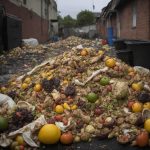 The food wasted globally is staggering. Despite that we make 5000 calories per person, when we only need 2500 calories, 733 million people go hungry everyday and nearly 3 billion people cannot afford a healthy diet. Globally, 25-30% of food is lost or wasted from farm to the household to landfill and it is estimated… Read more: 4 ways to reduce food waste
The food wasted globally is staggering. Despite that we make 5000 calories per person, when we only need 2500 calories, 733 million people go hungry everyday and nearly 3 billion people cannot afford a healthy diet. Globally, 25-30% of food is lost or wasted from farm to the household to landfill and it is estimated… Read more: 4 ways to reduce food waste - Seven ways to save water
 It is not obvious how our water use at home contributes to our carbon footprint. Our use of water contributes to our carbon footprint in a few ways: it needs to be treated and transported to us and then heated when we want hot water. All of this requires energy and adds to our carbon… Read more: Seven ways to save water
It is not obvious how our water use at home contributes to our carbon footprint. Our use of water contributes to our carbon footprint in a few ways: it needs to be treated and transported to us and then heated when we want hot water. All of this requires energy and adds to our carbon… Read more: Seven ways to save water - Myth-busting: recycling is not the most important thing
 Surveys suggest that people think recycling will make the biggest difference to their carbon footprint. There are countless blogs explaining how to reduce our waste to practically zero. However, the truth is no matter how much effort we put into recycling, it will neve reduce our carbon footprint as much as other actions and we… Read more: Myth-busting: recycling is not the most important thing
Surveys suggest that people think recycling will make the biggest difference to their carbon footprint. There are countless blogs explaining how to reduce our waste to practically zero. However, the truth is no matter how much effort we put into recycling, it will neve reduce our carbon footprint as much as other actions and we… Read more: Myth-busting: recycling is not the most important thing - What is a Net Zero house like?
 What will our houses be like in a Net Zero world? The answer is that it will not look that different to how it looks today! The only differences will be down to using renewable energy for electricity, swapping a heat pump for natural gas and creating an efficient heating-cooling system. Putting these changes in… Read more: What is a Net Zero house like?
What will our houses be like in a Net Zero world? The answer is that it will not look that different to how it looks today! The only differences will be down to using renewable energy for electricity, swapping a heat pump for natural gas and creating an efficient heating-cooling system. Putting these changes in… Read more: What is a Net Zero house like? - Four reasons to get solar panels
 Solar panels are an essential part of a Net Zero lifestyle and about 1.5 million homes in Britain now have them. Solar panels convert sunlight into electricity and are a renewable source of energy. They have become more popular since they have come down in price and there are financial incentives to adopt them such… Read more: Four reasons to get solar panels
Solar panels are an essential part of a Net Zero lifestyle and about 1.5 million homes in Britain now have them. Solar panels convert sunlight into electricity and are a renewable source of energy. They have become more popular since they have come down in price and there are financial incentives to adopt them such… Read more: Four reasons to get solar panels - Three reasons to get heat pumps
 Heat pumps are used for heating a house. They replace gas which is usually used for heating and electrifies it instead. It is considered a green option for home improvements because our national grid is partly powered by renewable energy. It is worth noting that heat pumps are not suitable for around half of the… Read more: Three reasons to get heat pumps
Heat pumps are used for heating a house. They replace gas which is usually used for heating and electrifies it instead. It is considered a green option for home improvements because our national grid is partly powered by renewable energy. It is worth noting that heat pumps are not suitable for around half of the… Read more: Three reasons to get heat pumps - How to create a clean tech house
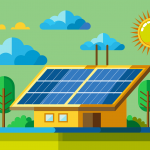 In a Net Zero world, a ‘clean tech’ house is the type of property we will be living in. These houses are like the ones we live in today but will have solar panels, proper insulation and a heat pump. Our household bills will also be 40-50% cheaper than today because of these innovations. To… Read more: How to create a clean tech house
In a Net Zero world, a ‘clean tech’ house is the type of property we will be living in. These houses are like the ones we live in today but will have solar panels, proper insulation and a heat pump. Our household bills will also be 40-50% cheaper than today because of these innovations. To… Read more: How to create a clean tech house - Carbon emission saving products for the bathroom
 How can we reduce our carbon footprint when using the bathroom? There are some products we can buy which will lower our water use and reduce the amount of waste we create. A water hippo in the cistern A water hippo is placed in the toilet cistern and save 3 litres of water every time… Read more: Carbon emission saving products for the bathroom
How can we reduce our carbon footprint when using the bathroom? There are some products we can buy which will lower our water use and reduce the amount of waste we create. A water hippo in the cistern A water hippo is placed in the toilet cistern and save 3 litres of water every time… Read more: Carbon emission saving products for the bathroom - How can we prevent electronic waste?
 We produce 50 tonnes of electronic waste globally each year. On top of this, over 80% of electronic goods are not recycled. What should you do with the electronics in your home? Smartphones Avoid getting upgrades on your smartphone and changing it regularly. If you do change your smart phone, choose one that is second… Read more: How can we prevent electronic waste?
We produce 50 tonnes of electronic waste globally each year. On top of this, over 80% of electronic goods are not recycled. What should you do with the electronics in your home? Smartphones Avoid getting upgrades on your smartphone and changing it regularly. If you do change your smart phone, choose one that is second… Read more: How can we prevent electronic waste? - How to draught proof your home
 We often hear that it is necessary to get a heat pump in our homes to reach Net Zero by 2050. This is true according to the Climate Change Committee, as they hope at least 80% of homes have a heat pump by 2040. But public opinion is mixed on heat pumps, and only 10%… Read more: How to draught proof your home
We often hear that it is necessary to get a heat pump in our homes to reach Net Zero by 2050. This is true according to the Climate Change Committee, as they hope at least 80% of homes have a heat pump by 2040. But public opinion is mixed on heat pumps, and only 10%… Read more: How to draught proof your home - How to avoid contamination in recycling
 Surveys suggest most people are confused about how to recycle. Surveys of the British public show up to 80% of UK households do not recycle things that could be recycled and 55% are ‘very unclear’ about what can and can’t be recycled. Because of this, it is assumed that only 50% of items that could… Read more: How to avoid contamination in recycling
Surveys suggest most people are confused about how to recycle. Surveys of the British public show up to 80% of UK households do not recycle things that could be recycled and 55% are ‘very unclear’ about what can and can’t be recycled. Because of this, it is assumed that only 50% of items that could… Read more: How to avoid contamination in recycling - 6 random facts about recycling properly
 Recycling properly is not easy if you don’t have some facts at hand. Here are a few easy rules to remember so you are recycling what you can. Do not scrunch up plastic bottles Do not flatten or scrunch up plastic bottles before you put them in the recycling bin. The reason why is because… Read more: 6 random facts about recycling properly
Recycling properly is not easy if you don’t have some facts at hand. Here are a few easy rules to remember so you are recycling what you can. Do not scrunch up plastic bottles Do not flatten or scrunch up plastic bottles before you put them in the recycling bin. The reason why is because… Read more: 6 random facts about recycling properly - How to look after wildlife in your garden
 Biodiversity, the variety of plant and animal life in our environment, has declined in the UK by 19% since 1970 and one in six species in the UK face extinction. On top of this, there has been a 74% drop in populations worldwide in mammals, bird, fish, reptiles and amphibians since 1970. Every effort we… Read more: How to look after wildlife in your garden
Biodiversity, the variety of plant and animal life in our environment, has declined in the UK by 19% since 1970 and one in six species in the UK face extinction. On top of this, there has been a 74% drop in populations worldwide in mammals, bird, fish, reptiles and amphibians since 1970. Every effort we… Read more: How to look after wildlife in your garden - What does reduce, reuse, recycle mean?
 Have you heard the phrase ‘reduce, reuse, recycle’ and wondered what it meant? The phrase refers to the waste hierarchy of waste management methods. It is best to reduce the amount waste first through prevention and minimisation. The next best method is to reuse existing products to extend their lifecycle. These approaches are better than… Read more: What does reduce, reuse, recycle mean?
Have you heard the phrase ‘reduce, reuse, recycle’ and wondered what it meant? The phrase refers to the waste hierarchy of waste management methods. It is best to reduce the amount waste first through prevention and minimisation. The next best method is to reuse existing products to extend their lifecycle. These approaches are better than… Read more: What does reduce, reuse, recycle mean? - Six ways to reduce food waste
 One of the biggest problems causing climate change is the amount of food wasted. We make enough food for each person in the world to consume 5000 calories, yet billions go hungry. A staggering 25-30% of food produced is wasted globally along the process from crop to fork to landfill. It is estimated that food… Read more: Six ways to reduce food waste
One of the biggest problems causing climate change is the amount of food wasted. We make enough food for each person in the world to consume 5000 calories, yet billions go hungry. A staggering 25-30% of food produced is wasted globally along the process from crop to fork to landfill. It is estimated that food… Read more: Six ways to reduce food waste - How to cool your home in an energy efficient way
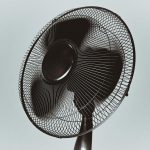 Heatwaves are going to be much more common in the future. Europe has struggled with heatwaves this summer with temperatures staying between 35-40 degrees Celsius. Around the world in Asia and Americas, there are places reaching 50 degrees Celsius. It is inevitable we prepare to live and work in prolong periods of intense heat. An… Read more: How to cool your home in an energy efficient way
Heatwaves are going to be much more common in the future. Europe has struggled with heatwaves this summer with temperatures staying between 35-40 degrees Celsius. Around the world in Asia and Americas, there are places reaching 50 degrees Celsius. It is inevitable we prepare to live and work in prolong periods of intense heat. An… Read more: How to cool your home in an energy efficient way - Solar panels: are they worth it?
 Solar panels are an important part of the strategy of getting to Net Zero by 2050, but are they right for you? Solar panels are getting increasingly popular in Britain with 1.5 million homes having already installed them. The best way to view solar panels is that it is a way of improving your finances.… Read more: Solar panels: are they worth it?
Solar panels are an important part of the strategy of getting to Net Zero by 2050, but are they right for you? Solar panels are getting increasingly popular in Britain with 1.5 million homes having already installed them. The best way to view solar panels is that it is a way of improving your finances.… Read more: Solar panels: are they worth it? - What is a Passivhaus?
 How low can the energy of a building become? The concept of the Passivhaus has put this to the test. A Passivehaus (Passive house in English) are buildings that can maintain constant temperature with minimal heating and cooling. These building are considered the gold standard in energy efficiency because of the way they are designed… Read more: What is a Passivhaus?
How low can the energy of a building become? The concept of the Passivhaus has put this to the test. A Passivehaus (Passive house in English) are buildings that can maintain constant temperature with minimal heating and cooling. These building are considered the gold standard in energy efficiency because of the way they are designed… Read more: What is a Passivhaus? - How to grow a low carbon garden
 How can your garden contribute to the fight against climate change? You can grow plants to lock away carbon for generations and boost biodiversity. Every action helps towards cutting carbon in our atmosphere and improving habitats for threatened species. Here are a few tips by Sally Nex from her book ‘How to garden the low… Read more: How to grow a low carbon garden
How can your garden contribute to the fight against climate change? You can grow plants to lock away carbon for generations and boost biodiversity. Every action helps towards cutting carbon in our atmosphere and improving habitats for threatened species. Here are a few tips by Sally Nex from her book ‘How to garden the low… Read more: How to grow a low carbon garden - Ways to catch rain to lower carbonfootprint of water use
 We are experiencing wetter winters and scorching summers as global warming continues. This is causing floods in the cold seasons and droughts in the hotter seasons across countries, and it will become commonplace in the future. As water shortages are inevitable and water bills will rocket up, it is wise to invest in a rain… Read more: Ways to catch rain to lower carbonfootprint of water use
We are experiencing wetter winters and scorching summers as global warming continues. This is causing floods in the cold seasons and droughts in the hotter seasons across countries, and it will become commonplace in the future. As water shortages are inevitable and water bills will rocket up, it is wise to invest in a rain… Read more: Ways to catch rain to lower carbonfootprint of water use - How to make large carbon emissions reducing investments in your home
 If you are interested in making big, long-term investments in your home to make it more energy efficient and lower your carbon footprint, it is best to investigate current technologies to see what is right for your home. You can make these investment work for you personally because there are reasons to invest in your… Read more: How to make large carbon emissions reducing investments in your home
If you are interested in making big, long-term investments in your home to make it more energy efficient and lower your carbon footprint, it is best to investigate current technologies to see what is right for your home. You can make these investment work for you personally because there are reasons to invest in your… Read more: How to make large carbon emissions reducing investments in your home - What actions make a big difference?
 The average British person produces 11 tonnes of carbon emissions a year. Ideally, we would halve our carbon footprint by 2030 if we to reach Net Zero by 2030. But this seems like a very big task. Do we need to make very big changes in our lifestyles? Dr Hannah Ritchie suggests that we focus… Read more: What actions make a big difference?
The average British person produces 11 tonnes of carbon emissions a year. Ideally, we would halve our carbon footprint by 2030 if we to reach Net Zero by 2030. But this seems like a very big task. Do we need to make very big changes in our lifestyles? Dr Hannah Ritchie suggests that we focus… Read more: What actions make a big difference? - The small actions that can add up
 The average British person produces 11 tonnes of carbon emissions a year. In our article ‘What actions make a big difference?’ about lifestyle changes that make a big difference to your carbon footprint. There are actions which are more well known to reduce our carbon footprint, but they do not make as much of an… Read more: The small actions that can add up
The average British person produces 11 tonnes of carbon emissions a year. In our article ‘What actions make a big difference?’ about lifestyle changes that make a big difference to your carbon footprint. There are actions which are more well known to reduce our carbon footprint, but they do not make as much of an… Read more: The small actions that can add up - Stay warmer, save money and the earth with heat controls
 We are in the middle of winter, so how do we stay warm and not waste energy heating our homes? What is important in any energy efficient home is having heating controls. Heating controls sets the temperature of your house and tells your heating system when to come on and off, so you do not… Read more: Stay warmer, save money and the earth with heat controls
We are in the middle of winter, so how do we stay warm and not waste energy heating our homes? What is important in any energy efficient home is having heating controls. Heating controls sets the temperature of your house and tells your heating system when to come on and off, so you do not… Read more: Stay warmer, save money and the earth with heat controls - Myth busting: heat pumps
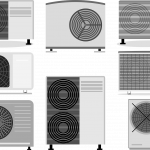 Heat pumps are not a popular idea amongst the public in the UK. A survey suggested recently at about half the population would not consider buying one. There many reasons people think this: heat pumps are considered too expensive, noisy and difficult to implement. However, if there is slow adoption of heat pumps by households,… Read more: Myth busting: heat pumps
Heat pumps are not a popular idea amongst the public in the UK. A survey suggested recently at about half the population would not consider buying one. There many reasons people think this: heat pumps are considered too expensive, noisy and difficult to implement. However, if there is slow adoption of heat pumps by households,… Read more: Myth busting: heat pumps